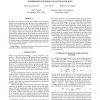Free Online Productivity Tools
i2Speak
i2Symbol
i2OCR
iTex2Img
iWeb2Print
iWeb2Shot
i2Type
iPdf2Split
iPdf2Merge
i2Bopomofo
i2Arabic
i2Style
i2Image
i2PDF
iLatex2Rtf
Sci2ools
133
click to vote
ICIP
2009
IEEE
2009
IEEE
Informative sensing of natural images
The theory of compressed sensing tells a dramatic story that sparse signals can be reconstructed near-perfectly from a small number of random measurements. However, recent work has found the story to be more complicated. For example, the projections based on principal component analysis work better than random projections for some images while the reverse is true for other images. Which feature of images makes such a distinction and what is the optimal set of projections for natural images? In this paper, we attempt to answer these questions with a novel formulation of compressed sensing. In particular, we find that bandwise random projections in which more projections are allocated to low spatial frequencies are near-optimal for natural images and demonstrate using experimental results that the bandwise random projections outperform other kinds of projections in image reconstruction.
Related Content
| Added | 19 Feb 2011 |
| Updated | 19 Feb 2011 |
| Type | Journal |
| Year | 2009 |
| Where | ICIP |
| Authors | Hyun Sung Chang, Yair Weiss, William T. Freeman |
Comments (0)

